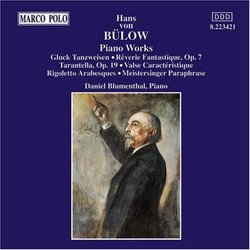| All Artists: Bulow, Blumenthal Title: Piano Transcriptions Members Wishing: 0 Total Copies: 0 Label: Marco Polo Release Date: 7/14/1994 Genres: Dance & Electronic, Classical Styles: Forms & Genres, Fantasies, Historical Periods, Classical (c.1770-1830) Number of Discs: 1 SwapaCD Credits: 1 UPC: 730099342124 |
Search - Bulow, Blumenthal :: Piano Transcriptions
 | Bulow, Blumenthal Piano Transcriptions Genres: Dance & Electronic, Classical
|
Larger Image |
CD Details |
CD ReviewsBülow - More than Conductor Hexameron | 07/16/2007 (4 out of 5 stars) "Hans von Bülow (1830-1894) was an illustrious figure in the nineteenth century: a rabid Wagnerite, an intense pupil and colleague of Liszt, a first-class pianist, and one of the finest conductors in music history. Bülow was director of countless conservatories, theaters and orchestras. He was the first to play the last five Beethoven sonatas in a single recital (from memory). He took the role of premiering Tchaikovsky's First Piano Concerto to the world. And his clever phrases and appellations have remained in the music world even today: the Three B's (Bach, Beethoven and Brahms), Bach's Well-Tempered Clavier as "Old Testament" and Beethoven's 32 Sonatas as the "New Testament."
The mention of Bülow's compositions, however, does not appear on his distinguished record, perhaps for good reason. His number of compositions extends at least to an Op. 20, but an accurate list of his works is difficult to find. The Marco Polo label and Daniel Blumenthal, however, do their best to compile his transcriptions, paraphrases and original works on a single CD. Bülow's contribution to the transcription repertoire is substantial with the dance airs from Gluck's "Iphigenie in Aulis." Donald Garvelmann, the liner-notes writer, states that "Gluck-in Bülow's hands-is tasteful, straightfoward and quite faithful to the original." The "Tanzweisen" is indeed a Baroque feast, containing beautiful moments, delightful rhythms and at times emotional weight (Sarabande and "Entrance of Achilles"), all crisp and pleasing on the piano. Bülow's own compositions are not original, but a few stand out from the rest: the Tarantella, Arabesques on Rigoletto and the Wagner paraphrase. Garvelmann calls the Tarantella "a wild virtuoso piece that conjures up the image of a spider-bitten victim dancing furiously to expel the venom." He says further that "Bülow's dance is both more demanding and harmonically varied than Chopin's youthful Tarantella of 1841." Although the Arabesque on Verdi's Rigoletto is not unique, Garvelmann believes it has some qualities: "While it lacks the high drama and flashy pyrotechnics of Liszt's famous virtuoso piece on Rigoletto, it has a more graceful charm than the Liszt and is closer in spirit to the delicacy of the touching original aria, Caro nome, on which it is based." Ultimately, I must think Bülow's best work is his Paraphrase of the quintet from Act III of Wagner's Die Meistersinger. It's always been difficult to transcribe Wagner's through-composed music, but as Garvelmann observes, "Bülow cleverly overcomes these problems by freely compressing, extending, and interweaving the themes, resulting in a compact, composite piece... Much of the sublime ecstasy of the original is retained, a testament to the extraordinary skill of the transcriber." Bottom line: Bülow's piano music might suffer from a lack of inspiration or memorability, so I would prefer to give this recording a 3.5 star-rating. However, since recordings of Bülow's piano music are rare, and considering the value of the Gluck transcriptions and Wagner paraphrase, I have no problem raising the Amazon rating to four stars instead of downgrading it to three." |

 Track Listings (16) - Disc #1
Track Listings (16) - Disc #1